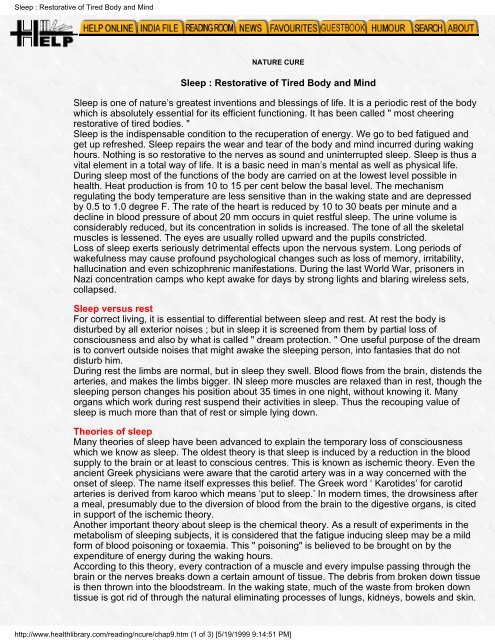A_Complete_Handbook_of_Nature_Cures
A_Complete_Handbook_of_Nature_Cures
A_Complete_Handbook_of_Nature_Cures
You also want an ePaper? Increase the reach of your titles
YUMPU automatically turns print PDFs into web optimized ePapers that Google loves.
Sleep : Restorative <strong>of</strong> Tired Body and Mind<br />
NATURE CURE<br />
Sleep : Restorative <strong>of</strong> Tired Body and Mind<br />
Sleep is one <strong>of</strong> nature’s greatest inventions and blessings <strong>of</strong> life. It is a periodic rest <strong>of</strong> the body<br />
which is absolutely essential for its efficient functioning. It has been called " most cheering<br />
restorative <strong>of</strong> tired bodies. "<br />
Sleep is the indispensable condition to the recuperation <strong>of</strong> energy. We go to bed fatigued and<br />
get up refreshed. Sleep repairs the wear and tear <strong>of</strong> the body and mind incurred during waking<br />
hours. Nothing is so restorative to the nerves as sound and uninterrupted sleep. Sleep is thus a<br />
vital element in a total way <strong>of</strong> life. It is a basic need in man’s mental as well as physical life.<br />
During sleep most <strong>of</strong> the functions <strong>of</strong> the body are carried on at the lowest level possible in<br />
health. Heat production is from 10 to 15 per cent below the basal level. The mechanism<br />
regulating the body temperature are less sensitive than in the waking state and are depressed<br />
by 0.5 to 1.0 degree F. The rate <strong>of</strong> the heart is reduced by 10 to 30 beats per minute and a<br />
decline in blood pressure <strong>of</strong> about 20 mm occurs in quiet restful sleep. The urine volume is<br />
considerably reduced, but its concentration in solids is increased. The tone <strong>of</strong> all the skeletal<br />
muscles is lessened. The eyes are usually rolled upward and the pupils constricted.<br />
Loss <strong>of</strong> sleep exerts seriously detrimental effects upon the nervous system. Long periods <strong>of</strong><br />
wakefulness may cause pr<strong>of</strong>ound psychological changes such as loss <strong>of</strong> memory, irritability,<br />
hallucination and even schizophrenic manifestations. During the last World War, prisoners in<br />
Nazi concentration camps who kept awake for days by strong lights and blaring wireless sets,<br />
collapsed.<br />
Sleep versus rest<br />
For correct living, it is essential to differential between sleep and rest. At rest the body is<br />
disturbed by all exterior noises ; but in sleep it is screened from them by partial loss <strong>of</strong><br />
consciousness and also by what is called " dream protection. " One useful purpose <strong>of</strong> the dream<br />
is to convert outside noises that might awake the sleeping person, into fantasies that do not<br />
disturb him.<br />
During rest the limbs are normal, but in sleep they swell. Blood flows from the brain, distends the<br />
arteries, and makes the limbs bigger. IN sleep more muscles are relaxed than in rest, though the<br />
sleeping person changes his position about 35 times in one night, without knowing it. Many<br />
organs which work during rest suspend their activities in sleep. Thus the recouping value <strong>of</strong><br />
sleep is much more than that <strong>of</strong> rest or simple lying down.<br />
Theories <strong>of</strong> sleep<br />
Many theories <strong>of</strong> sleep have been advanced to explain the temporary loss <strong>of</strong> consciousness<br />
which we know as sleep. The oldest theory is that sleep is induced by a reduction in the blood<br />
supply to the brain or at least to conscious centres. This is known as ischemic theory. Even the<br />
ancient Greek physicians were aware that the carotid artery was in a way concerned with the<br />
onset <strong>of</strong> sleep. The name itself expresses this belief. The Greek word ‘ Karotides’ for carotid<br />
arteries is derived from karoo which means ‘put to sleep.’ In modern times, the drowsiness after<br />
a meal, presumably due to the diversion <strong>of</strong> blood from the brain to the digestive organs, is cited<br />
in support <strong>of</strong> the ischemic theory.<br />
Another important theory about sleep is the chemical theory. As a result <strong>of</strong> experiments in the<br />
metabolism <strong>of</strong> sleeping subjects, it is considered that the fatigue inducing sleep may be a mild<br />
form <strong>of</strong> blood poisoning or toxaemia. This " poisoning" is believed to be brought on by the<br />
expenditure <strong>of</strong> energy during the waking hours.<br />
According to this theory, every contraction <strong>of</strong> a muscle and every impulse passing through the<br />
brain or the nerves breaks down a certain amount <strong>of</strong> tissue. The debris from broken down tissue<br />
is then thrown into the bloodstream. In the waking state, much <strong>of</strong> the waste from broken down<br />
tissue is got rid <strong>of</strong> through the natural eliminating processes <strong>of</strong> lungs, kidneys, bowels and skin.<br />
http://www.healthlibrary.com/reading/ncure/chap9.htm (1 <strong>of</strong> 3) [5/19/1999 9:14:51 PM]












![[Pham_Sherisse]_Frommer's_Southeast_Asia(Book4You)](https://img.yumpu.com/38206466/1/166x260/pham-sherisse-frommers-southeast-asiabook4you.jpg?quality=85)




